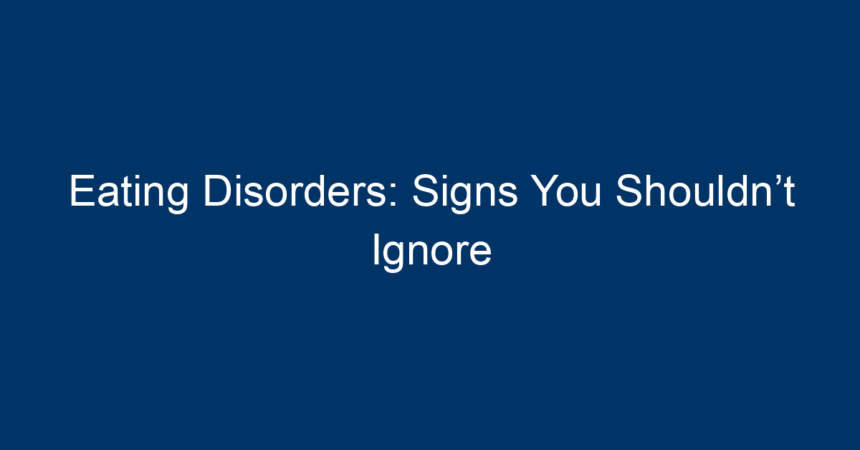Eating disorders are complex mental health conditions that can have severe consequences for both physical and emotional well-being. The spectrum of eating disorders ranges from anorexia nervosa to bulimia nervosa to binge-eating disorder, and all can lead to grave health issues. Recognizing the signs of these disorders early can save lives. In this article, we’ll explore the critical signs you shouldn’t ignore, offering valuable insights into how you can support yourself or a loved one facing these challenges.
Understanding Eating Disorders
Eating disorders affect millions of individuals worldwide, predominantly adolescents and young adults. They can stem from a variety of factors, including genetics, psychological issues, societal pressures, and cultural influences. While it’s crucial to approach this topic with sensitivity, awareness of the signs can play a pivotal role in early intervention.
Common Types of Eating Disorders
- Anorexia Nervosa: Characterized by extreme restriction of food intake, often accompanied by an intense fear of gaining weight.
- Bulimia Nervosa: Involves cycles of binge eating followed by compensatory behaviors like vomiting or excessive exercise.
- Binge-Eating Disorder: Marked by recurring episodes of eating large quantities of food without the compensatory behaviors seen in bulimia.
- Avoidant/Restrictive Food Intake Disorder (ARFID): A lack of interest in eating, leading to significant weight loss or nutritional deficiency.
Each of these disorders presents unique challenges and symptoms, making awareness and understanding essential for effective management.
The Warning Signs of Eating Disorders
Recognizing eating disorders early can drastically improve the outcome for the individual involved. Here are the signs you shouldn’t ignore:
1. Significant Weight Changes
Sudden weight loss or weight gain is often a red flag. While fluctuations in weight can be normal, substantial changes in a short period may indicate an eating disorder.
- Anorexia Nervosa: Individuals may drop below a healthy weight.
- Binge-Eating Disorder: Many struggle with obesity due to excessive food consumption.
2. Preoccupation with Food and Body Image
A constant obsession with food—whether that involves counting calories, planning meals obsessively, or scrutinizing ingredients—can indicate an unhealthy relationship with eating.
- Bulimia Nervosa: This often leads to binge-eating sessions where the individual consumes excessive amounts, followed by guilt and compensatory behaviors.
3. Avoidance of Social Situations Involving Food
Individuals with eating disorders may withdraw from social outings that involve food. They might create excuses to skip meals or avoid gatherings where food is served.
- Anorexia Nervosa: Often manifests as a desire to avoid situations that may trigger eating-related anxiety.
4. Physical Symptoms
Unexplained physical symptoms can also be warning signs of an eating disorder. These may include:
- Fatigue: Chronic tiredness from malnutrition.
- Digestive Issues: Problems like bloating, constipation, or diarrhea often arise, especially in bulimia.
- Dental Issues: Tooth decay and erosion of enamel can result from frequent vomiting in bulimia.
5. Emotional Instability
Eating disorders often lead to profound emotional swings, including:
- Increased Anxiety: Individuals may feel overwhelmed or anxious about their body image or food choices.
- Depression: Feelings of worthlessness and sadness can be persistent.
Paying attention to these emotional signs is critical, as they often overlap with the disorder’s physical symptoms.
6. Ritualistic Eating Behaviors
People suffering from eating disorders may develop specific food rituals. This can include:
- Eating food in a particular order.
- Chewing food excessively.
- Eating only specific brands or types of food.
These behaviors can serve as coping mechanisms for anxiety or distress.
7. Changes in Exercise Habits
An extreme change in exercise routines can also suggest the presence of an eating disorder. This may manifest as:
- Excessive Exercise: Engaging in workouts beyond typical recommendations, often to compensate for food intake.
- Avoidance of Regular Activities: Prioritizing exercise over social commitments and responsibilities.
The relationship between eating and exercise is fragile in individuals struggling with eating disorders.
Consequences of Ignoring Eating Disorders
Ignoring the signs of an eating disorder can have devastating effects. These disorders can lead to:
- Severe Health Complications: Long-term malnutrition can cause irreversible damage to vital organs, including the heart, liver, and kidneys.
- Psychological Impact: Left unchecked, eating disorders can exacerbate mental health issues like anxiety, depression, and even suicidal tendencies.
- Long-term Struggles: Recovery often becomes more challenging the longer an eating disorder persists.
Steps to Take if You or Someone You Know is Affected
If you identify these signs in yourself or a loved one, addressing the issue promptly is crucial. Here are actionable steps you can take:
Seeking Professional Help
Consulting healthcare providers specializing in eating disorders is essential. They can offer medical, psychological, and nutritional support tailored to individual needs.
Encouraging Open Dialogue
Creating a safe space for open conversations about feelings and behaviors surrounding food can foster an environment of trust. This dialogue can be the first step toward recovery.
Educating Yourself and Others
The more you understand eating disorders, the better equipped you’ll be to recognize issues and approach them without stigma. Share this knowledge to help others become aware of the symptoms.
Establishing a Support Network
Whether it’s family, friends, or support groups, having a strong network can provide emotional support during recovery. Encourage loved ones to participate in therapy sessions when appropriate.
Fostering Healthy Eating Habits
Promoting a positive relationship with food can be beneficial. This includes:
- Balanced Eating: Encouraging diversity in food choices.
- Mindful Eating: Teaching individuals to listen to their bodies and eat when hungry.
Conclusion
Eating disorders are serious and often life-threatening conditions that require immediate attention. By recognizing the signs and understanding the serious consequences of ignoring them, we can provide critical support to those in need.
From significant weight changes to emotional instability, being aware of the signs of eating disorders can make a profound difference. If you or someone you care about is experiencing these struggles, don’t hesitate to reach out for help. Recovery is possible, and it begins with awareness, understanding, and action. Remember, addressing these disorders early can lead to healthier and happier lives.




